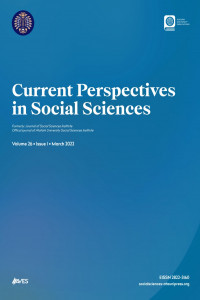What Makes an Immigrant Prisoners Satisfied? The Case of Afghans in Turkey
This article aims to evaluate the life satisfaction of immigrant prisoners placed in a prison in eastern Turkey by focusing on economic and non-economic factors. A questionnaire was applied to
90 male prisoners in this prison. The dependent variable is a standard life satisfaction question,
ranging from 0 (not at all satisfied) to 10 (completely satisfied). The data used in the study were
analyzed with the ordinary least squares (OLS) regression analysis method. Findings show that
household income satisfaction positively affects inmates’ happiness. A statistically significant difference was found between the mean happiness before and after migration. There has been a
significant decrease in the happiness of individuals who have been imprisoned after migration.
Factors such as satisfaction with the length of stay in Turkey and being informed about legal
rights have positive effects on life satisfaction. As the level of education increases, the happiness
of individuals decreases
Anahtar Kelimeler:
Afghan immigrant, income, legal rights, life satisfaction, prisoners
___
- Adams, K. (1992). Adjusting to prison life. Crime and Justice, 16, 275–359. [CrossRef]
- Baltatescu, S. (2005). Subjective well-being of immigrants in Europe and their evaluation of societal conditions. An exploratory study (SSRN Scholarly Paper ID 871519). Social Science Research Network. https://papers.ssrn.com/abstract=871519
- Bartram, D. (2011). ‘Economic migration and happiness: Comparing immigrants’ and natives’ happiness gains from income. Social Indicators Research, 103(1), 57–76. [CrossRef]
- Bartram, D. (2013). Migration, return, and happiness in Romania. European Societies, 15(3), 408–422. [CrossRef]
- Blanchflower, D. G., & Oswald, A. J. (2004). Well-being over time in Britain and the USA. Journal of Public Economics, 88(7–8), 1359–1386. [CrossRef]
- Blanchflower, D. G., & Oswald, A. J. (2008). Is well-being U-shaped over the life cycle? Social Science and Medicine, 66(8), 1733–1749. [CrossRef]
- Boothby, J. L., & Durham, T. W. (1999). Screening for depression in prisoners using the Beck Depression Inventory. Criminal Justice and Behavior, 26(1), 107–124. [CrossRef]
- Borjas, G. J. (1989). Economic theory and international migration. International Migration Review, 23(3), 457–485. [CrossRef]
- Brunner, E. (1997). Stress and the biology of inequality. BMJ, 314(7092), 1472–1476. [CrossRef]
- Carruthers, C., & Jepsen, C. (2020). Vocational education: An international perspective (SSRN Scholarly Paper ID 3740330). Social Science Research Network. [CrossRef]
- Cevahir, E. (2020). SPSS ile nicel veri analizi rehberi. Kibele.
- Chindarkar, N. (2014). Is subjective well-being of concern to potential migrants from Latin America? Social Indicators Research, 115(1), 159–182. [CrossRef]
- Clark, A. E. (2003). Unemployment as a social norm: Psychological evidence from panel data. Journal of Labor Economics, 21(2), 323–351. [CrossRef]
- Clemmer, D. (1940). The prison community. Christopher Publishing House.
- Clemmer, D. (1950). Observations on imprisonment as a source of criminality. Journal of Criminal Law and Criminology (1931–1951), 41(3), 311–319. [CrossRef]
- Cobden, J., & Stewart, G. (1984). Breaking out: A perspective on long-term imprisonment and the process of release. Canadian Journal of Criminology, 26(4), 500–510. [CrossRef]
- Combalbert, N., Pennequin, V., Ferrand, C., Keita, M., & Geffray, B. (2019). Effect of age, time spent in prison and level of education on the perceived health and quality of life of elderly prisoners. International Journal of Prisoner Health, 15(2), 168–180. [CrossRef]
- Crewe, B., Liebling, A., & Hulley, S. (2011). Staff culture, use of authority and prisoner quality of life in public and private sector prisons. Australian and New Zealand Journal of Criminology, 44(1), 94–115. [CrossRef]
- Cuñado, J., & de Gracia, F. P. (2012). Does education affect happiness? Evidence for Spain. Social Indicators Research, 108(1), 185–196. [CrossRef]
- Diamond, P. M., Wang, E. W., Holzer, C. E., Thomas, C., & Cruser, des, A. (2001). The prevalence of mental illness in prison. Administration and Policy in Mental Health, 29(1), 21–40. [CrossRef]
- Erlinghagen, M. (2011). Nowhere better than here?The subjective well-being of german emigrants and remigrants. Comparative Population Studies, 36(4). [CrossRef]
- Başlangıç: 2003
- Yayıncı: Atatürk Üniversitesi
Sayıdaki Diğer Makaleler
What Makes an Immigrant Prisoners Satisfied? The Case of Afghans in Turkey
İbradı (Antalya) Eynif Ovası Yılkı Atları ve Türkiye’de Yılkı Atları Üzerine Genel Bir Değerlendirme
Berna ÖZOĞUL, Fatma EMİROĞLU AYDIN, İhsan BULUT
Disillusionment and Silence in British Trench Poems: Voices from World War I
İyimserlik Ölçeği: Geçerlik ve Güvenirlik Çalışması “Revizyon”
Müge YILMAZ, Abdullah ALDEMİR, Seher BALCI ÇELİK
Antik Çağ’da Phûsis ve Etik: Platon, Aristoteles ve Stoacılar
Türkiye’de Gençlerin Sağlığa Erişimi Ne Ölçüde Karşılanıyor?
Birinci Dünya Savaşı Sürecinde ve Sonrasında Bursa ve Çevresinde Ermeni Faaliyetleri
